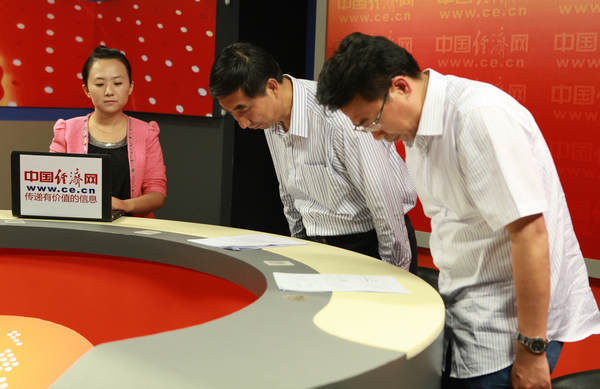Society
Pollution apology fails to calm public anger
By Tan Zongyang (China Daily)
Updated: 2011-06-13 10:15
 |
Large Medium Small |
|
 Wu Zhijun (center), head of the Harbin Pharmaceutical Group, and Han Hongbin (right), director of the group's environmental protection department, bow in apology to the public during a TV program in Beijing on Saturday. The two were apologizing for the pollution the group's Harbin factories caused. [Photo/www.ce.cn] |
BEIJING/HARBIN - Harbin Pharmaceutical Group, one of China's biggest drug manufacturers, made a public apology on Saturday for the severe pollution caused by its Harbin factories.
"The group would like to accept any penalties for our wrongdoing to the local environment," Wu Zhijun, head and representative of the group, said in a public letter of apology over the weekend.
The group and its management team took "unshirkable" responsibility for the damage to the environment, Wu said, admitting the pollution had harmful effects on the residents living near the factories.
|
||||
"The apology is a cliche - nothing more than a show to calm the public," said Tian Jiawei, a senior doctor at the No 2 Hospital affiliated to Harbin Medical University, which stands beside the factories.
Tian, who has lived in the area for more than 30 years, said she has witnessed how the air in the community, where there are now four universities, a hospital and several residential compounds, has grown increasingly polluted.
"The pungent smell of the waste gas would even wake people up at night," she said.
Tian said the factories started to emit more toxic waste in the last decade as they increased their output without controlling waste emissions.
Tian, who is also a political consultative committee member of Heilongjiang province, submitted motions to the local government three times.
"I have been appealing for an immediate shutdown or relocation of the pollution source for the sake of residents' health, but failed," she said.
A resident, surnamed Wang, who lives in a building adjacent to the factory, said: "We have called on the government many times to move the factory, but it didn't work. We residents can only wait and hope when being poisoned."
In the letter of apology, the group said it was rushing to upgrade its waste treatment equipment and reduce discharges from its antibiotics factories and outlined several measures to tackle the pollution it has already caused.
The group said it had cut the production of products that would cause pollution and suspended operation of some drug-producing units.
It also said 1.43 million yuan ($220,600) was invested in waste-water treatment systems, which will begin operating on Wednesday, and similar facilities will be adopted to deal with gas and solid waste as well.
Wu Zhijun, the group head, said in an earlier interview that the group expected to invest 70 million yuan in environmental protection this year. But this is a fraction of the 500 million yuan that the group plans to spend on advertising this year, according to Beijing Daily.
Yang Xiaodi, deputy director of the publicity office at the environmental protection bureau of Harbin, told China Daily the local environmental authority had dispatched an investigation team to the factory to oversee the rectification process.
Yang also said the city's deputy Party secretary, Jiang Ming, paid a visit to the factory on Sunday.
The factory will sign a contract with the government on Tuesday to finalize the sites for its new plant, located in the city's outer suburbs and downwind, according to Yang.
The new plant is expected to be under construction later this year.
Tian Xuefei and Zhao Yunpeng contributed to this story.
| 分享按鈕 |


